TUM Think Tank
Where today's societal challenges meet tomorrow's technological excellence.
How can we pave the way for a bright quantum future?
Last Thursday, PushQuantum started its semester program in collaboration with the Quantum Social Lab. We were pleased to welcome Ilyas Khan to the TUM Think Tank for this special day. The Founder and CPO of Quantinuum did not only join a panel discussion but also spent some quality time with the student’s club members.
One event highlight was the panel discussion, which centered around the future of quantum technologies. Ilyas Khan was joined by Robert Wille, professor at TU Munich and Chief Scientific Officer at the Software Competence Center Hagenberg, and Fabienne Marco, Head of the Quantum Social Lab and Project Lead of QuantWorld.
The panelists shared their perspectives on the future of quantum technologies, drawing from their diverse backgrounds spanning from the quantum computing industry over mathematics and political science to software development.
The panel moderator, Alexander Orlov (PushQuantum), challenged our panelists with questions ranging from the anticipated advancements and major challenges in quantum computing, including education and policy making, to personal experiences. In addition, he elicited rare advice from the panelists on how to accelerate the students’ careers in quantum technology-related fields in an impactful way.
Key takeaways included the importance of learning from past mistakes, finding suitable approaches for education within quantum technologies (and specifically quantum computing), and the need for interdisciplinary work in the field of quantum technology.
When asked about the future of quantum and what will be the crucial factor within further and fast development, Ilyas Khan suggested shifting the focus from coherence times to entropy. ‘I would say that of all the things that matter in the context of possible advantage, I’d encourage you to think of cross-entropy because it can be validated or not. [...] And I think this year, we will incontrovertibly pass that threshold. There is zero question in my mind.’
Talking about education and future talents, the ‘current challenge lies in matching the needs for different parts of the society and a more holistic and interdisciplinary approach within education,’ according to Fabienne Marco.
A common position the panelists had was the importance of changing the narrative within the media from fear to the opportunities connected with quantum technology.
Robert Wille pointed out how important it is to distinguish who is best equipped to solve different challenges: ‘When it comes to quantum computing software, computer scientists have to lead the way.’ Drawing from his personal experience, he also emphasized the importance of sometimes challenging yourself by entering new scientific bubbles to share solutions and avoid reinventing existing solutions in other disciplines.
Thanks to all the panelists for the insightful discussion!
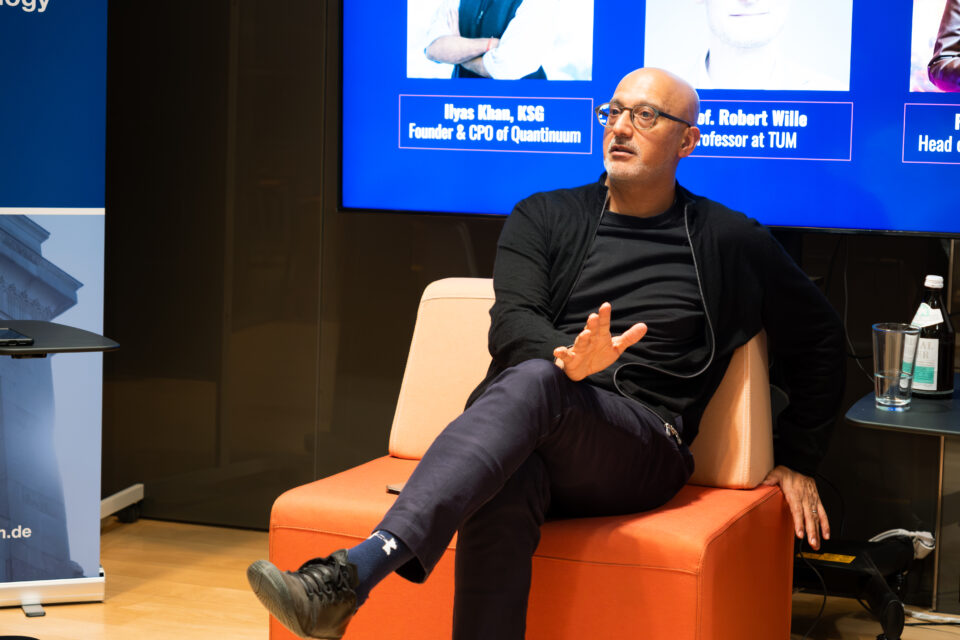
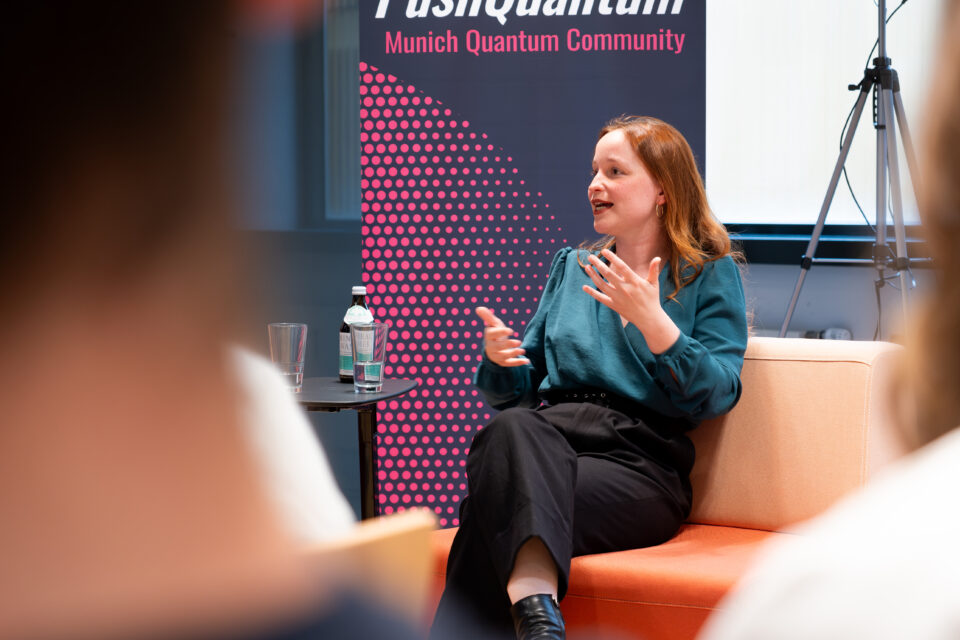

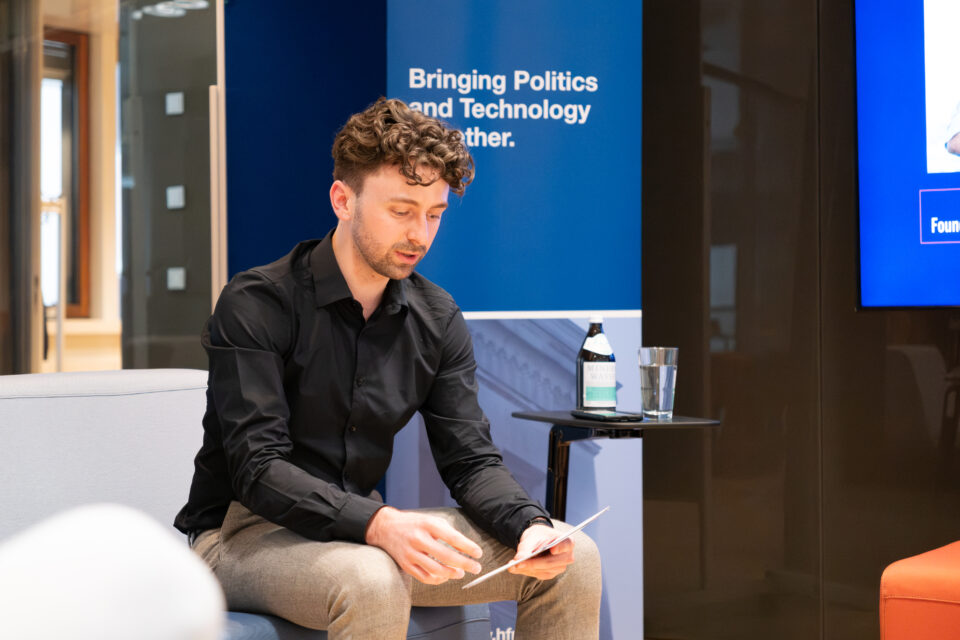
PushQuantum is a Munich-based student club which offers real world-focused education in quantum tech. Within TUM Think Tank's Public Policy Impact Program, PushQuantum focuses on actively contributing to shaping a responsible quantum future - a vision shared with the Quantum Social Lab.
Are you a passionate informatics student eager to contribute to an innovative learning platform? The Quantum Social Lab is looking for informatics students to do their interdisciplinary project (IDP) within our flagship project QuantWorld.
About the project
The aim of the project is to impart knowledge of quantum technologies 2.0 to target groups and to make them tangible. For this purpose, the module-based QuantWorld learning platform with certification options meets people in their respective living and working environments. The focus is on the living environments of mobility, banking and medicine.
In this project you work on the following topics:
- Create a digital learning platform for QuantWorld
- Integrate interactive modules into the digital learning platform
- Support on the creation of the QuantWorld website
- Create interactive presentation materials on the topic of quantum technology
- Cut science videos for the learning platform
- You are always welcome to contribute your ideas to the project!
Your benefits
- Integration in a interdisciplinary team of IDP students at TUM Think Tank.
- Build a network in an expert environment.
- Exchange ideas with various experts from the field of art, politics, architecture, physics,
games engineering and data science. - Better chances on the job market: After submitting your thesis or project work, you will
receive a reference certificate if required
More information
- ECTS credits, e.g. as part of a a compulsory or research internship.
- Opportunity to write thesis with TUM Think Tank.
- Work can be done from a remote position if required
- Start is flexible.
- The duration of work is flexible: but there a fixed dates.
- Voluntary participation in various workshops and lectures as part of the QuantWorld project
- Co-working in the heart of Munich with unlimited supply of coffee (personal use only)
Requirements
- Interest in the topic of quantum technology
- Good knowledge of programming websites (in particular wordpress), digital learning platforms and digital modules
- Intermediate knowledge or interest in cutting programs as Adobe Premiere
- Team player skills
- High motivation and independent way of working, proactive and self-organized
Interested in becoming part of the QuantWorld-project?
For questions and registration, please contact Alisha Ogidan.
Quantum technologies can potentially reshape our society, for better or worse. For instance, quantum simulations could play a pivotal role in combating climate change, yet they could also be exploited to develop chemical weapons. How can we ensure that our society benefits from quantum technologies while mitigating potential risks?
In a commenary titled "A call for responsible quantum technology," published today in Nature Physics, Urs Gasser of the Quantum Social Lab at the TUM Think Tank, along with co-authors Eline De Jong and Mauritz Kop, advocate for the responsible handling of quantum technologies and the establishment of guidelines. Based on an international interdisciplinary effort led by the Stanford Center for Responsible Quantum Technology, the authors introduce a framework for responsible quantum technologies that integrates ethical, legal, socio-ecological, and policy implications into the research and development of quantum technologies.
Developing suitable guardrails and governance frameworks for quantum technologies are among the main objectives of the Quantum Social Lab, co-directed by Urs Gasser and Fabienne Marco. Towards this end, the lab brings together an interdisciplinary community to examine, evaluate, and help shape the development and use of quantum-based applications, and promote responsible innovation.
"History teaches us that ethical, legal, socio-economic, and policy implications are often only an afterthought when a powerful technology has already made its way from the lab into the wild,” says lead author Urs Gasser. “Given the possible ramifications of quantum technology, we should not repeat this mistake and create guardrails while it is still malleable. Our call in Nature Physics invites the science community to help shape defining principles and practices.”
The full commentary on responsible quantum technology can be found in Nature Physics:
Artificial intelligence and quantum technologies - disruptive technologies that can change the world. On February 6, Bavarian State Minister Markus Blume visited the TUM Think Tank. On the occasion of the launch of the QuantWorld project, funded by the Federal Ministry of Education and Research (BMBF) with 1.9 million euros, the TUM Think Tank presented two of its projects to the Bavarian State Minister of Science and the Arts: the Quantum Social Lab and the Generative AI Taskforce. An in-depth insight into the projects of the TUM Think Tank, which not only drives innovation, but also embodies an innovative entity itself.
The Generative AI Taskforce promotes responsible innovation
"ChatGPT was the 'iPhone moment' of generative AI," explained Noha Lea Halim, who presented the TUM Think Tank's Generative AI Taskforce. Generative Artificial Intelligence (AI) - most notably ChatGPT - has fundamentally changed our technological landscape. The rapid market entry of these new technologies has created a tension between innovation and regulation. To navigate these questions, the TUM Think Tank launched the Generative AI Taskforce in April last year. "The task force here at the TUM Think Tank ensures a transfer of knowledge from universities to industry and the state and strengthens Bavaria's pioneering role in the global AI landscape," says Halim.
Quantum technologies: The social transformation of tomorrow - already in view today
"In keeping with the theme of the iPhone moment of artificial intelligence, we are still waiting for the so-called QDay in the field of quantum technology," explained Urs Gasser, Rector of the Munich School of Public Policy (HfP). "Even though traditional computing systems are still widely used today, quantum technologies are already here and have the potential to change the future forever."
This is why Urs Gasser and Fabienne Marco founded the Quantum Social Lab in September 2022 with the support of TUM President Thomas Hofmann. The Quantum Social Lab deals with the ethical, legal, social and technical challenges and opportunities that await us in the course of the further development of this technology. As part of this, the Lab will bring these new technologies closer to citizens with the help of artists and a participatory learning platform through the QuantWorld project, which is funded by the Federal Ministry of Education and Research (BMBF) to the tune of 1.9 million euros. In view of the expected disruptive effects of second-generation quantum technologies, the project is investigating specific future scenarios in the fields of medicine, banking and mobility. "We don't know what the future will look like with second-generation quantum technologies, but we shouldn't miss the opportunity to shape it," Fabienne Marco, head of the lab, concludes.
"A think tank in the best sense of the word and a real flagship for AI research and AI application in Bavaria: the TUM Think Tank's projects fit in perfectly with Bavaria's AI measures. The AI age and the coming quantum revolution bring with them ethical, regulatory and social challenges that we want to address at an early stage. The Quantum Social Lab and the Generative AI Taskforce are preparing citizens and decision-makers in Bavaria for the opportunities and social impact of these disruptive technologies. We are delighted that these important programs are being implemented in Bavaria and are therefore happy to continue supporting the research and projects at the TUM Think Tank!" say the Bavarian State Minister for Science and the Arts, Markus Blume.
The Bavarian state government is actively committed to investing in key technologies, education, research, infrastructure, transfer and science as part of its high-tech agenda. The Minister's visit underlines the importance of innovation and collaboration between research institutions and public administration to push the frontiers of society and technological development. The Generative AI Taskforce and the Quantum Social Lab are just two examples of how social and technological transformation come together in the TUM Think Tank and at the HfP. We would like to thank the Minister of State for Science and the Arts, Markus Blume, for his visit and his great interest, and we look forward to further collaboration.
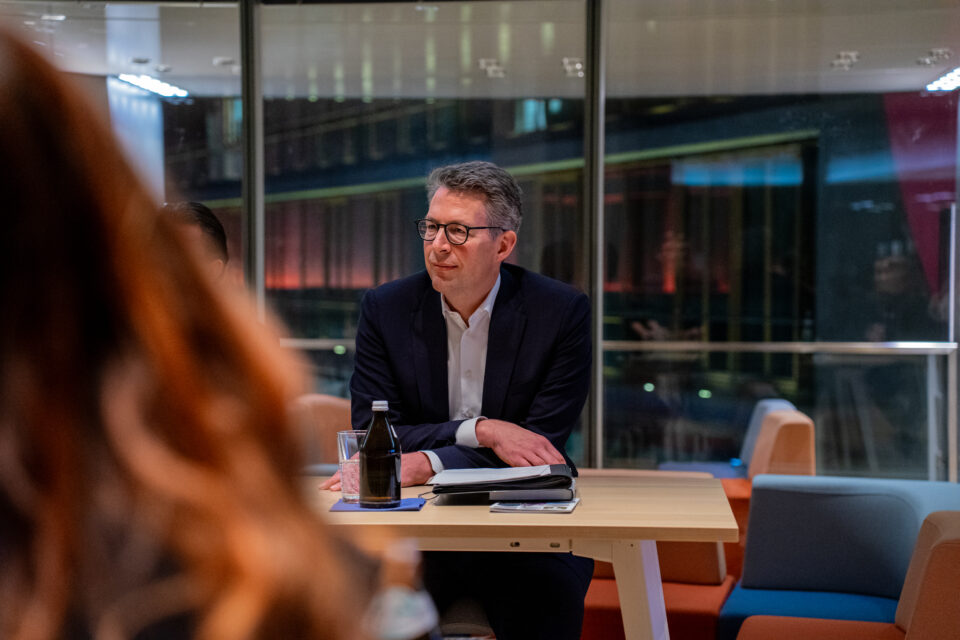
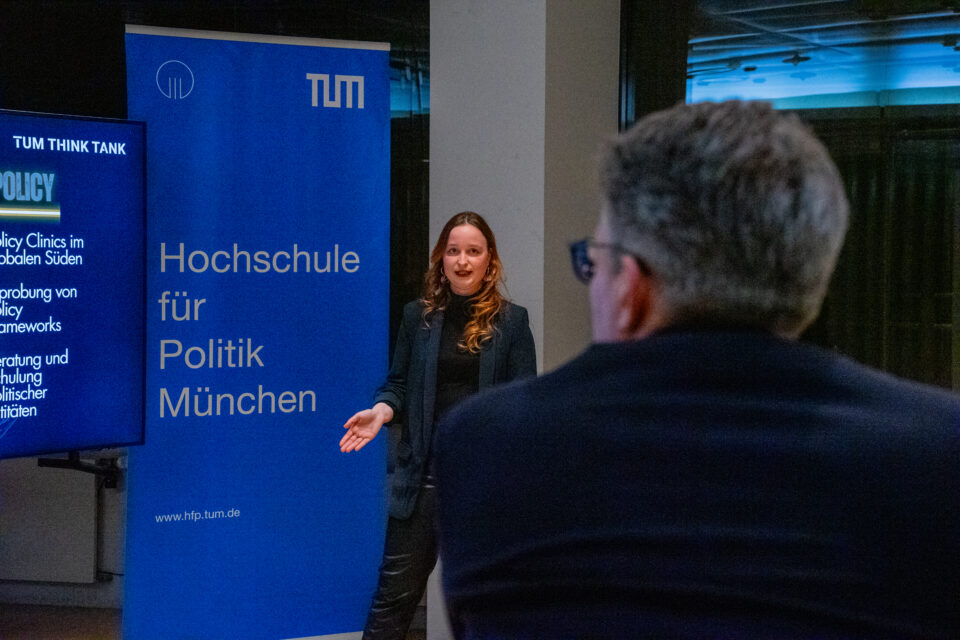
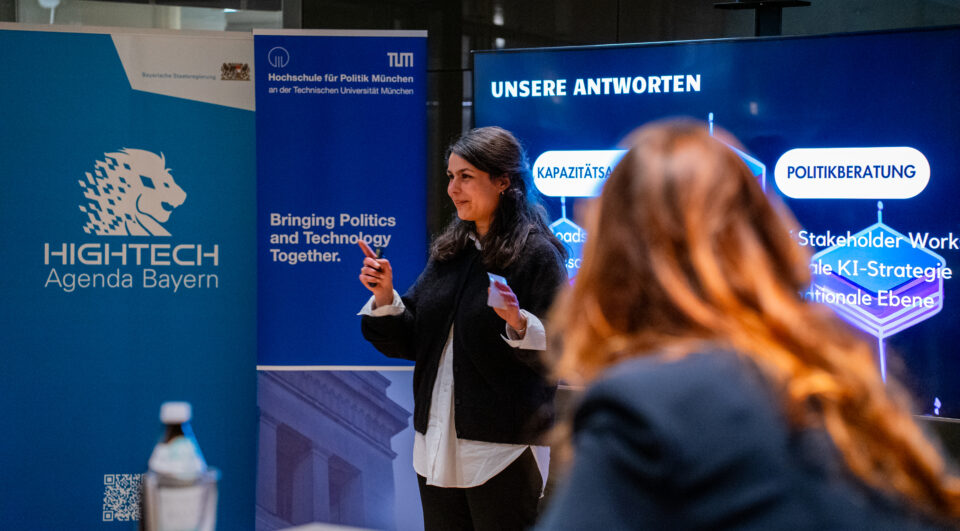
The rapid development of quantum technologies (QT) promises an economic innovation boost, new breakthroughs in science, and unprecedented solutions to global societal problems. For years, TUM and the Munich region have been a hub for innovation and research in the field of quantum technologies. This research is now complemented by a flagship project from the newly established Quantum Social Lab at the TUM Think Tank. Supported by the BMBF with a total of 1.9 million euros, the project "QuantWorld" focuses on the future of responsible technology development, making quantum technologies understandable to people where they will impact their daily work. The project integrates social aspects into the world of quantum technologies and takes new methodological approaches by involving artists in knowledge dissemination, making quantum technologies experiential.
Quantum Technologies: The Path to the Future
Quantum technologies have the potential to reshape the world as we know it. Applications range from personalized drug development to contributions, climate protection through innovative battery technologies, to agricultural optimization based on more accurate predictions of natural events. While some applications such as quantum sensors in medical imaging are already on the market, others - like powerful quantum computers and developments in quantum communication - are still in their infancy.
To harness the full innovation potential of quantum technologies while also addressing their risks, including security threats or access equity, it is essential to engage with their societal dimensions and anticipate the potential impacts on people in their (professional) daily lives while technical development is still malleable.
This is where the "QuantWorld" project comes in. Funded by the Federal Ministry of Education and Research (BMBF),it enables citizens, regardless of their background, to gain insight into the world of quantum technologies today and prepare for the future. The project is part of the Quantum Social Lab at the TUM Think Tank and was developed in collaboration with Fraunhofer AISEC and the TUM Clinic Rechts der Isar entstanden.
Urs Gasser, Principal Investigator of the project and Dean of the TUM School of Social Sciences and Technology, sums up this challenge:"Quantum technologies can help us build a better future in many ways. However, we must ensure that societal, political, and ethical implications are considered from the outset, and technical innovations align with the well-being of people. We must avoid the mistake of only thinking about these aspects, as we did with AI, when applications emerge from the labs. QuantWorld is an attempt to be more proactive and participatory."
A Unique Educational Platform
The QuantWorld project provides a unique educational platform to introduce people to the world of quantum technologies, regardless of their prior knowledge. It combines innovative teaching methods, including artistic interventions, to make quantum technologies tangible and create a basis for a broad dialogue on the societal challenges associated with the development and establishment of second-generation quantum technologies.
Fabienne Marco, a doctoral candidate in computer science and political science who leads the Quantum Social Lab, provides a glimpse into the future: "Quantum technologies are abstract and built on complex mathematical and physical principles. Representing this abstraction requires new methods. Artistic interventions enable us to provide a new and disruptive way of accessing these technologies, initiating a transfer from the academic world to society, politics, and business. This concept will be further developed in the coming years to build an interdisciplinary network that focuses on the innovative communication of cutting-edge technologies and their applications, as well as the associated societal challenges."
Upon project completion, all suitable modules will be integrated into a QuantumBasics course, offering an overview of the fundamental workings of second-generation quantum technologies and potential future scenarios in the fields of medicine, banking, and mobility. Additionally, the artistic interventions will be made digitally accessible. In the long term, the learning experience from the QuantWorld platform will be transformed into virtual course formats to create an "immersive twin" of QuantWorld.
The project aligns with TUM's vision, committed to human-centered engineering. Thomas Hoffmann, President of TUM, emphasizes the importance of this approach: "This societal reference to complex technologies is critical for our innovation location in Munich. The QuantWorld project marks a crucial step toward a future where innovation and technology development are responsible, socially accepted, and sustainable."
For more information about "QuantWorld," please visit here.
About the Quantum Social Lab and the TUM Think Tank
The Quantum Social Lab focuses on researching and shaping the societal opportunities and risks surrounding quantum technologies, addressing responsible innovation and regulation, among other topics. It also offers various forms of knowledge dissemination regarding the theoretical and technological foundations of quantum technologies and is part of the TUM Think Tank.
The TUM Think Tank promotes societal and political change by bridging theory and practice. It creates interdisciplinary learning and experimentation spaces where stakeholders from science, society, and politics collaborate on specific questions and problems related to responsible technologies.
